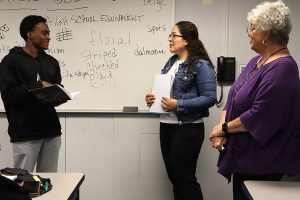The Chemistry program is a transfer program that is approved by the Illinois Board of Higher Education and the ICCB. The program provides the standard foundations of chemical principles and procedures with an emphasis on analytical problem solving methodology along with “real life” applications. In addition, the program introduces an advanced laboratory component that involves the use of state of the art instrumentation such as the FTIR, HPLC and GC Mass Spec. At the end of the program, students will have earned an AS.
Mission
The mission of the Chemistry program is to prepare students for a seamless transfer into a four-year institution to pursue careers in analytical and organic Chemistry that will benefit the world in which we live. In addition, many of our students successfully enter and complete Pharmacy and Medical schools.
Student Learning Outcomes (SLOs)
General Chemistry:
- Develop a general literacy in the field of inorganic chemistry.
- Demonstrate an understanding of basic chemical principles.
- Use and apply these basic principles in everyday life scenarios.
- Apply the scientific method through analysis of data, methods of verification and drawing valid conclusions.
- Demonstrate the skills necessary to make and report precise measurements using a variety of scientific instruments and techniques.
- Students will be able to properly name various standard and complex chemical compounds.
- Students will master the procedure of how to write and balance standard and complex chemical reactions.
- Students will be able to interpret and solve various types of chemistry problems with involve Stoichiometry, Chemical rates, Heat transfer, Solution Chemistry, Titration, Chemical equilibrium and gases.
Organic Chemistry:
- Develop a working knowledge of the structure of organic compounds and describe the chemical bonding within the molecules.
- Demonstrate an understanding of nomenclature relative to organic compounds using the IUPAC naming system.
- Develop a technique for writing organic reactions and synthesis.
- Write and interpret various types of mechanisms of organic reactions.
- Apply advanced laboratory techniques for separation and purification of organic compounds.
- Synthesize representative organic compounds in the laboratory.
- Identify unknown organic compounds using instrumental and other laboratory techniques.
Overview for College Success
Overview for College Success (OCS 121) is a course designed to assist students in the navigation of becoming successful in college and life. Major topics include setting academic, career and personal goals; effective communication strategies; study skills; critical thinking; self-discovery; and learning styles. In addition, this course delves into topics such as stress management, diversity and other well-being topics. Students will develop educational and career plans, learn to utilize college resources and receive extensive help in course planning. OCS 121 credit is not calculated in the course minimum credit totals listed in this section.
Students must take OCS 121 if they meet one or more of the following:
- First time degree seeking students.
- Transfer student with less than 12 credit hours and no evidence of similar course on transcript.
- Registering for 6 or more credits.
- Test into 2 or more developmental classes.
- Currently does not have OCS credit or registered for OCS.
Recommended Transfer Curriculum
This is only a suggested transfer program and might not be appropriate for every student. Some four-year institutions accept more than 62 credits in transfer to complete requirements in chemistry. Consult the College & Career Success Center for help in selecting courses appropriate for the program at the college or university where you plan to transfer.
Faculty are available during scheduled office hours to advise students about their courses and programs. Peruse some of the offerings in the Physical Sciences Department.
All full-time transfer students are required to take OCS 121.
Minimum General Education Core Courses (45)
| Overview for College Success | CREDITS | |
|---|---|---|
| OCS 121 | Overview for College Success | 1 |
| Communications (9) | ||
|---|---|---|
| ENG 101 | Composition and Rhetoric | 3 |
| ENG 102 | Composition and Research | 3 |
| SPE 108 | Oral Communication | 3 |
| Humanities and Fine Arts (9) | ||
| GROUP II | Select from Humanities Electives Students earning an Associate degree must meet the requirement for coursework on improving human relations as defined in Public Act 87-581. |
9 |
| Social and Behavioral Science (9) | ||
| GROUP III | Select from Social Science Electives Students earning an Associate degree must meet the requirement for coursework on improving human relations as defined in Public Act 87-581. |
9 |
| Mathematics (5) | ||
| MTH 190 | Calculus and Analytic Geometry I | 5 |
| Physical and Life Science (8-9) | ||
| CHM 113 | General Chemistry I | 5 |
| Life Science class | 4 | |
Area of Concentration/Electives (18-22)
The selected electives listed below may satisfy the additional Math and Physical or Life Science courses required for the AS.
| CHM 114 | General Chemistry II | 5 |
| CHM 203 | Organic Chemistry I | 5 |
| CHM 204 | Organic Chemistry II | 5 |
| PHY 210 | University Physics I Many four-year institutions may also require PHY 211. |
4 |
| MTH 203 | Calculus and Analytic Geometry II Many four-year institutions require MTH 204 with the possibly MTH 205. |
5 |
| Minimum for AS Degree | 62-65 | |
|---|---|---|




